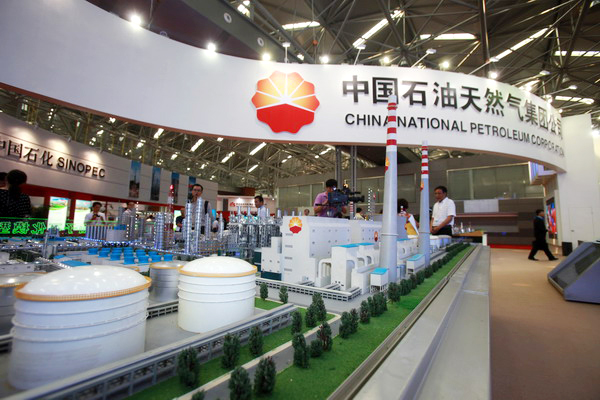Stop risky overseas acquisitions
Updated: 2016-08-29 07:07
(China Daily)
|
|||||||||
 |
|
China National Petroleum Corp's booth at a trade show in Tianjin in September, 2013.[Photo/China Daily] |
China's two State-owned oil giants, China National Petroleum and China National Offshore Oil Corporation, recently made public their profits for the first half of this year.
CNPC made a net profit of only 531 million yuan ($79.6 million), a decline of 98 percent year-on-year, while CNOOC suffered a loss of 7.74 billion yuan; its first half-year loss since 2001.
Undoubtedly, plunging oil prices in recent years are one of the main reasons behind the two oil companies' poor performance. But CNOOC's losses are also related to its bolder and ill-considered overseas acquisitions. Although it did not mention it in its half-year report, all insiders know that CNOOC's acquisition of Nexen remains a major reason behind its fiscal deficit. When CNOOC announced its acquisition of the leading Canadian energy producer for $15.1 billion in 2013, it was the largest overseas acquisition by a Chinese company, and there were concerns that the deal would not be profitable.
An investment bank pointed out in its report at the time that only if Brent crude oil maintained an average price of $93 per barrel could CNOOC hope to make a profit on its investment. Unfortunately, oil prices dived 50 percent the following year. Also, Nexen has encountered endless troubles in Canada, such as its pipeline ruptures in July 2015 that caused huge maintenance costs and fines for CNOOC.
Chinese enterprises made more than 600 overseas acquisitions in 2015, with a total value of $120 billion. However, in the first half of this year alone, acquisitions by Chinese enterprises have already exceeded that figure.
In the past decade, almost no one has been held accountable for the losses China's State companies have suffered in their overseas acquisitions. It is time for the government to tighten its monitoring over the overseas acquisitions by its SOEs and prevent any reckless decisions from causing unavoidable losses to State properties.
-Beijing Youth Daily
Related Stories
China's Giant leads acquisition of Caesars' mobile gaming unit 2016-08-01 15:15
China firms rise on global stage on innovation, acquisition 2016-07-02 11:09
China on path to top world's cross-border acquisition list 2016-06-04 16:45
Suning shares surge 6.24% on Taobao's acquisition 2016-06-04 09:45
Officials celebrate Chinese acquisition in Michigan 2016-04-20 11:31
Successful overseas operations of merger, acquisition by Chinese firms 2016-04-09 17:29
Today's Top News
Italy plans state funeral for quake victims; 268 dead
China rescue team rushes to Italy for earthquake relief
Poland: 1st European state to issue RMB debt in China
Italy rescuers toil as death toll hits nearly 250
More understanding among remaining EU states
At least 73 dead after strong quake strikes Italy
Turkey launch operation in north Syria to fight IS
UK manufacturing export orders highest in 2 years after Brexit vote
Hot Topics
Lunar probe , China growth forecasts, Emission rules get tougher, China seen through 'colored lens', International board,
Editor's Picks

|

|

|

|

|

|







